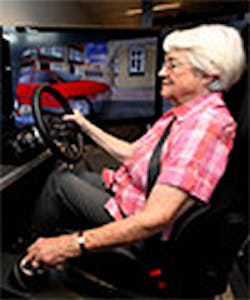Research car helps team study habits of older drivers
A unique research car has been fitted out with eye tracking systems and bio-monitors by engineers at Newcastle University (Newcastle, UK) to monitor the concentration, stress levels and driving habits of drivers.
Research shows that giving up driving is one of the key factors responsible for a fall in health and well-being among older people, leading to them becoming more isolated and inactive.
Led by Professor Phil Blythe, the Newcastle team is investigating in-vehicle technologies for such older drivers which could help them continue driving into later life. These include bespoke navigation tools, night vision systems and intelligent speed adaptation devices.
Using the new so-called DriveLAB as well as the University’s driving simulator, the team has been working with older people from across the North East and Scotland to understand their driving habits and fears and look at ways of overcoming them.
By incorporating the eye tracker and bio-monitor with the driving simulator the team are able to monitor eye movement, speed, reaction, lane position, acceleration, braking and driving efficiency.
Funded by Research Councils UK’s Digital Economy program the research is part of the Social inclusion through the Digital Economy (SiDE) project, a £12m research hub led by Newcastle University.
The work is being presented at the Aging, Mobility and Quality of Life conference which is being held at the University of Michigan between June 24-26.
-- by Dave Wilson, Senior Editor, Vision Systems Design
